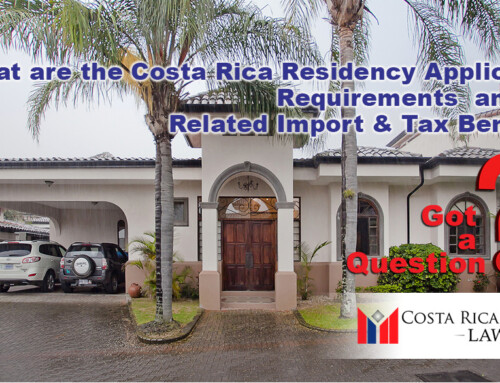What are the Benefits of Incorporating a Costa Rica Holding Company?
Particularly when purchasing a property in Costa Rica, the question often arises as to whether the Registered Property Title in the National Registry, should be held in the name of the purchaser in their personal capacity, or a Costa Rica Holding Company specifically incorporated for the purpose. Recent changes in the law surrounding the annual legal reporting requirements for Costa Rica companies and the cost of meeting these requirements, has shed a different light on the practicality of incorporating a company. The additional annual corporate costs and filing requirements may out-weigh any practical benefit of incorporating a Costa Rica holding company.
Limited Liability
The corporate structure does afford the shareholders the legal limited liability protection from claims exceeding the value of the assets of the company. In other jurisdictions such as the United States and Canada, this is a very important consideration, given the litigious nature of those societies. However, Costa Rica by nature and by virtue of the complications of utilizing the Courts to settle liability claims, is not as litigious a jurisdiction by comparison. Having a Property Insurance Policy with a reasonable amount of third party liability coverage is adequate protection against any third party damages claims in most circumstances.
The Costs of Incorporating and Annual Company Maintenance Fees
Apart from the costs associated with incorporating a Costa Rica Holding Company, registering the Company with the Costa Rica Tax Department, and meeting the requirement of registering the Beneficial Shareholders with the Costa Rica Central Bank, there are now significant on-going Government annual reporting requirements, which will require professional fees to be paid by the company owner(s), to keep the company current. Any changes to the Beneficial Shareholders of the company must be updated with the Costa Rica Central Bank, a Company Flat Tax must be paid annually during the month of January, and an annual Tax Return must be filed with the Tax Department for active and inactive Holding Companies and payment of a Cultural and Education Stamp Tax, by March 15th of each year. There is a requirement for the company to have an official physical address within Costa Rica for the service of legal documentation, usually being a lawyer’s office, where the Company Books are also kept for an annual fee.
The Capital Gains Tax Benefit of Incorporating
In the year 2019, a Capital Gains Tax of 15% assessed on the amount of the gain in value of the property, at the time of a property sale of an investment property, was introduced. The Capital Gains Tax is calculated on the difference in the registered property value amount declared in the National Registry at the time of the owner’s purchase of the property and the declared value at the date of the property sale. This tax amount is subject to set-off adjustments for items such as renovation costs undertaken by the owner and the like. If the property has been owned prior to the July 1, 2019 introduction of the Capital Gains Tax, the option of electing to pay 2.25% of the gross sale proceeds, without deductions, on a one time basis, rather than the 15% Capital Gains Tax amount, is available to the Seller.
The good news is that for property owners where the property constitutes their principal residence and they are domiciled within Costa Rica for at least 184 cumulative days in the fiscal year prior to the sale, there is an exemption from the payment of this Capital Gains Tax on a sale of the property. However, on a sale of investment property where the property is registered to a personal owner, there is a requirement for the Closing Notary in a property sale transaction, to deduct and remit 2.5% of the gross sale proceeds to the Costa Rica Tax Department, to cover any outstanding tax liability that may be owing. In the case of an investment property having the property title registered in the National Registry in the name of a Costa Rica company, or an extra-judicially registered foreign company, the company is deemed to be domiciled in Costa Rica and no such remittance to the Tax Department is required to be made by the Closing Notary at the time of a property sale.
My Opinion
In my opinion, the benefit of incorporating a Costa Rica Holding Company is based on the aspect of whether the property constitutes the principal residence of the property owner, or is an investment property. If the property is to be used as a principal residence, I would suggest registering the property title in the National Registry in the personal name of the property owner. No Capital Gains Tax liability will arise on a property sale and incorporation costs and annual company maintenance fees would be avoided.
If the property is purchased for investment purposes only, a purchaser may wish to consider registering the property title in the name of a Costa Rica Holding Company. This will avoid the remittance by the Closing Notary of 2.5% of the gross property sale proceeds to the Tax Department at the time of a property sale. I would estimate that in the majority of such circumstances, such a large remittance amount would greatly exceed any actual tax liability owing on the property sale and any return to the Seller by the Tax Department of the excess in remitted funds, may take some considerable time.






